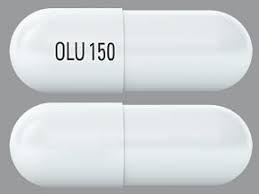Olutasidenib
Generic name: olutasidenib [ oh-LOO-ta-SID-e-nib ]
Brand name: Rezlidhia
Dosage form: oral capsule (150 mg)
Drug class: Miscellaneous antineoplastics
What is olutasidenib?
Olutasidenib is used to treat acute myeloid leukemia (AML) in adults with a specific gene mutation called isocitrate dehydrogenase-1 (IDH1).
Olutasidenib is given after other treatments did not work or stopped working.
Your doctor will perform tests to make sure olutasidenib is the right treatment for you.
Olutasidenib may also be used for purposes not listed in this medication guide.
Olutasidenib side effects
Get emergency medical help if you have signs of an allergic reaction: hives; difficult breathing; swelling of your face, lips, tongue, or throat.
Seek medical help right away if you have symptoms of differentiation syndrome: fever, dizziness, cough, trouble breathing, swelling, rapid weight gain, rash, or decreased urination.
Olutasidenib may cause serious side effects. Call your doctor at once if you have:
-
nausea, constipation, diarrhea, vomiting, stomach pain or mouth sores; or
-
liver problems--loss of appetite, stomach pain (upper right side), tiredness, itching, dark urine, clay-colored stools, jaundice (yellowing of the skin or eyes).
Common side effects of olutasidenib may include:
-
abnormal blood tests;
-
nausea, diarrhea, constipation, mouth sores;
-
rash;
-
tiredness, not feeling well, fever.
This is not a complete list of side effects and others may occur. Call your doctor for medical advice about side effects. You may report side effects to FDA at 1-800-FDA-1088.
Related/similar drugs
Warnings
Seek medical help right away if you have symptoms of differentiation syndrome: fever, dizziness, cough, trouble breathing, swelling, rapid weight gain, rash, or decreased urination.
Before taking this medicine
Tell your doctor if you have ever had:
-
liver problems.
Olutasidenib may harm an unborn baby. Tell your doctor if you are pregnant.
Do not breastfeed while using olutasidenib, and for at least 2 weeks after your last dose.
How should I take olutasidenib?
Follow all directions on your prescription label and read all medication guides or instruction sheets. Use the medicine exactly as directed.
Take olutasidenib twice a day (12 hours apart) around the same time every day.
Take on an empty stomach, at least 1 hour before or 2 hours after a meal.
Swallow the capsule whole and do not crush, chew, break, or open it.
If you vomit shortly after taking olutasidenib, do not take another dose. Take your next dose as scheduled.
You will need medical tests before and during treatment with olutasidenib.
Your treatment may be changed or permanently discontinued if you have certain side effects.
Store at room temperature away from moisture and heat.
Olutasidenib dosing information
Usual Adult Dose for Acute Myeloid Leukemia:
Initial dose: 150 mg orally twice daily on an empty stomach
Duration of therapy: Until disease progression or unacceptable toxicity
Comments:
-Patients are screened for this treatment based on the presence of Isocitrate dehydrogenase-1 (IDH1) mutations in blood or bone marrow.
-FDA-approved tests for the detection of IDH1 mutation in acute myeloid leukemia (AML) are available at http://www.fda.gov/CompanionDiagnostics.
-If there is no instance of unacceptable toxicity or progressive disease during treatment, continue the treatment for 6 months to allow for clinical response.
Use: Treatment of relapsed or refractory AML with a susceptible isocitrate dehydrogenase-1 (IDH1) mutation
What happens if I miss a dose?
Use the medicine as soon as you can, but skip the missed dose if your next dose is due in less than 8 hours. Do not use two doses within 8 hours.
What happens if I overdose?
Seek emergency medical attention or call the Poison Help line at 1-800-222-1222.
What should I avoid while taking olutasidenib?
Follow your doctor's instructions about any restrictions on food, beverages, or activity.
What other drugs will affect olutasidenib?
Sometimes it is not safe to use certain medicines at the same time. Some drugs can affect your blood levels of other drugs you use, which may increase side effects or make the medicines less effective.
Other drugs may affect olutasidenib, including prescription and over-the-counter medicines, vitamins, and herbal products. Tell your doctor about all other medicines you use.
More about olutasidenib
- Check interactions
- Compare alternatives
- Side effects
- Dosage information
- During pregnancy
- Drug class: miscellaneous antineoplastics
- Breastfeeding
- En español
Patient resources
Other brands
Professional resources
Other brands
Related treatment guides
Further information
Remember, keep this and all other medicines out of the reach of children, never share your medicines with others, and use this medication only for the indication prescribed.
Always consult your healthcare provider to ensure the information displayed on this page applies to your personal circumstances.
Copyright 1996-2025 Cerner Multum, Inc. Version: 1.01.

